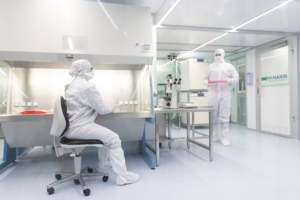Minaris to be commercial manufacturer in Europe for Skysona, bluebird bio’s gene therapy for CALD
Minaris Regenerative Medicine, a leading contract development and manufacturing organization for the cell and gene therapy industry, will be the commercial manufacturer in Europe for bluebird bio’s Skysona (elivaldogene autotemcel, formerly Lenti-D gene therapy), for the treatment of Early Cerebral Adrenoleukodystrophy (CALD).
The announcement follows, the European Commission’s (EC) granting of marketing authorization for Skysona, the only gene therapy for patients with CALD, a life-threatening progressive neurodegenerative disease.
Skysona was granted marketing authorization as a one-time gene therapy for the treatment of early CALD in patients less than 18 years of age with an ABCD1 genetic mutation, and for whom a human leukocyte antigen-matched sibling hematopoietic stem cell (HSC) donor is not available.
Skysona was reviewed as part of the European Medicines Agency’s Priority Medicines scheme (PRIME) and was previously granted Orphan Medicinal Product status. The marketing authorization is valid in all 27 member states of the EU, as well as Norway, Liechtenstein, and Iceland.
Adrenoleukodystrophy (ALD) is a rare, X-linked metabolic disorder that primarily affects males; worldwide, an estimated one in 21,000 male newborns are diagnosed with ALD. The disorder is caused by mutations in the ABCD1 gene that affect the production of adrenoleukodystrophy protein (ALDP) and subsequently causes toxic accumulation of very long-chain fatty acids (VLCFAs), primarily in the adrenal gland and white matter of the brain and spinal cord. Approximately 40% of boys with ALD will develop CALD, the most severe form of ALD. CALD is a progressive and irreversible neurodegenerative disease that involves the breakdown of myelin, the protective sheath that nerve cells need to function effectively, especially for thinking and muscle control. The onset of symptoms of CALD typically occurs in childhood. Early diagnosis of CALD is essential as the outcome of treatment varies with the clinical stage of the disease. Therefore, treatment must be administered before the disease progresses too far.
Skysona uses ex vivo transduction with the Lenti-D lentiviral vector to add functional copies of the ABCD1 gene into a patient’s own HSCs. The addition of the functional ABCD1 gene allows patients to produce the ALD protein (ALDP), which is thought to facilitate the breakdown of VLCFAs. The expression of ALDP and effect of Skysona is expected to be life-long. The goal of treatment with Skysona is to stop the progression of CALD and, consequently, preserve as much neurological function as possible, including the preservation of motor function and communication ability. Importantly, with Skysona, there is no need for donor HSCs from another person.
“We are proud to contribute to the fight against this devastating disease in children and to support bluebird bio also with their second commercial product,” said Dusan Kosijer, CEO of Minaris Regenerative Medicine.
Andrew Obenshain, president, severe genetic diseases, bluebird bio commented: “Minaris is our long-standing partner for bringing gene therapies to patients in Europe. Our collaboration will be integral as we work to provide Skysona to the community who faces the rapid and irreversible effects of CALD.”
In 2016, Minaris and bluebird bio entered into a strategic manufacturing partnership for commercial production of Zynteglo for transfusion-dependent β-thalassemia and Skysona for CALD in Europe. In 2020, the companies expanded their manufacturing partnership to include late stage and commercial drug product manufacturing both in Europe and the USA (at Minaris Regenerative Medicine, LLC) of LentiGlobin for the treatment of patients with sickle cell disease.


